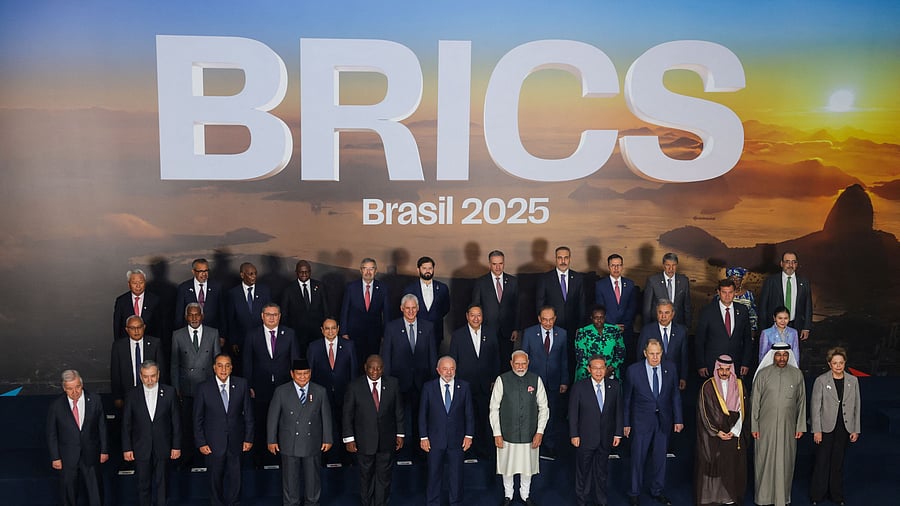
Leaders of the BRICS group pose for the family photo during the BRICS Summit in Rio de Janeiro, Brazil July 7, 2025.
Credit: Reuters Photo
India has reason to be satisfied with the outcome of the BRICS summit in Rio de Janeiro.
The meeting’s declaration has included strong condemnation of the Pahalgam terror attack while backing the call for a comprehensive reform of the United Nations Security Council. It also took a veiled swipe at the tariff wars unleashed by United States President Donald Trump, and sought a greater role for the rule-based trading system of the World Trade Organization (WTO). Issues related to the Global South have equally been highlighted in the resolution.
In the larger geopolitical context, however, the summit will be judged on a different basis. It is on whether the 10-member bloc has a claim to become an alternative pole for global leadership. This issue has not yet been resolved with any clarity.
The Rio meet lost much of its sheen in the absence of both Russian President Vladimir Putin and Chinese President Xi Jinping. The vacuum was filled to some extent by Prime Minister Narendra Modi, who spoke out on the need to combat terrorism, as well as on the creaking architecture of the UN system. In an era of artificial intelligence (AI), he felt it was unthinkable that global institutions had not been upgraded even once in 80 years. He even likened it to 21st-century software being run on 20th-century typewriters. The final statement echoed his call for reform of not just the UN but the WTO and multilateral development banks.
Modi’s comments on the unfair treatment of the Global South were made to a bloc that has enlarged considerably since being created in 2009, and now consists of: Brazil, China, Egypt, Ethiopia, India, Indonesia, Iran, Russia, South Africa, and the UAE. In addition, the Rio summit was attended by 10 countries, defined as strategic partners. These include Belarus, Cuba, Malaysia, Nigeria, and Vietnam.
The diversity of the bloc, both in geographical and ideological terms, has meant that creating multipolarity in the world through the forum is going to be a challenge. The host, Brazil, this time confined the agenda of the summit to relatively non-controversial issues like climate change. But the final declaration covered a wide swathe of global flashpoints including Iran, the Ukraine and West Asia, as well as the terrorist attack in India. New Delhi may have been enthused by the condemnation of this attack but the strikes on Iran have also been castigated though without mention of either the US or Israel. Unlike at the Shanghai Cooperation Organisation (SCO), India has not distanced itself from this criticism, clearly due to the recent dialling down of Indo-US bonhomie.
Yet the bloc’s lack of homogeneity has not prevented the US from viewing it as an emerging power centre. Trump’s public ire clearly stems from a perception of a potential risk from this fast-enlarging entity. Following the 2024 Russia summit, Trump warned that a 100 per cent tariff would be imposed on those seeking de-dollarisation. The threat this time is a 10 per cent tariff on any country aligning with BRIC’s ‘anti-American’ policies.
India’s reaction to the earlier threat had been conciliatory as External Affairs Minister S Jaishankar denied any interest in de-dollarisation. Russia and China have now responded by noting that the bloc had no aggressive designs on other countries; but India has not commented on it. This reflects the chill in bilateral ties owing to needless irritants created by Trump. These have been in the form of continuing to claim the glory for the India-Pakistan ceasefire, along with persistent barbs over India’s tariff policies.
BRICS is, thus, a work in progress. Its members have the advantage of accounting for a big chunk of global GDP — 35 per cent. And it looks set to become even bigger as more countries vie to join up. But this alone cannot enable the disparate bloc to become an effective lobby for the Global South. On the plus side, the Rio summit has enabled it to come together with a big ask for the UN. That is the expansion of the UNSC to include emerging economies like Brazil and India. The demand is justified. The global high table remains severely imbalanced without these significant economic powers. BRICS could become a force to reckon with if it succeeds in this single endeavour.
(Sushma Ramachandran is a senior journalist)
Disclaimer: The views expressed in this article are the author's own. They do not necessarily reflect the views of DH.